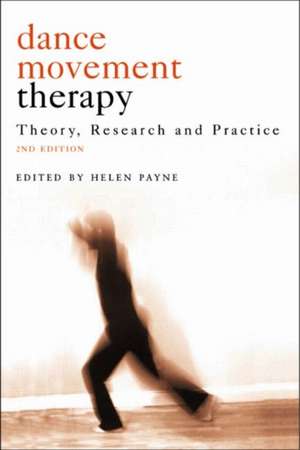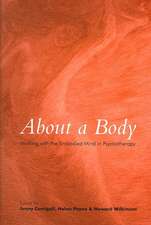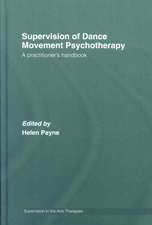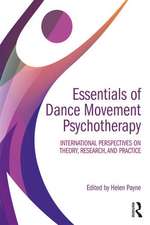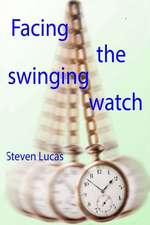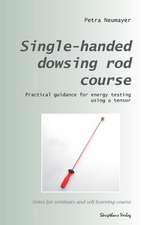Dance Movement Psychotherapy: Theory, Research and Practice
Editat de Helen Payneen Limba Engleză Paperback – 25 mai 2006
This thoroughly updated edition of Dance Movement Therapy echoes the increased world-wide interest in dance movement therapy and makes a strong contribution to the emerging awareness of the nature of embodiment in psychotherapy. Recent research is incorporated, along with developments in theory and practice, to provide a comprehensive overview of this fast-growing field.
Helen Payne brings together contributions from experts in the field to offer the reader a valuable insight into the theory and practice of dance movement therapy. The contributions reflect the breadth of developing approaches, covering subjects including:
- dance movement therapy with people with dementia
- group work with people with enduring mental health difficulties
- transcultural competence in dance movement therapy
- Freudian thought applied to authentic movement
- embodiment in dance movement therapy training and practice
- personal development through dance movement therapy.
Preț: 312.12 lei
Nou
59.72€ • 62.52$ • 49.42£
Carte disponibilă
Livrare economică 15-29 martie
Livrare express 04-08 martie pentru 35.23 lei
Specificații
ISBN-10: 1583917039
Pagini: 284
Ilustrații: 6 black & white tables, 2 black & white halftones, 6 black & white line drawings
Dimensiuni: 156 x 234 x 22 mm
Greutate: 0.52 kg
Ediția:Revizuită
Editura: Taylor & Francis
Colecția Routledge
Locul publicării:Oxford, United Kingdom
Public țintă
Postgraduate, Professional, and Professional Practice & DevelopmentCuprins
Preface Helen Payne, Introduction ߝ Embodiment in Action Helen Payne, Opening doors: Dance movement therapy with people with dementia Ute Kowarzik, Dance movement therapy in the community: Group work with people with enduring mental health difficulties Vicky Karkou, Dancing with demons: Dance movement therapy and complex post traumatic stress disorder Jeanette MacDonald, Dance movement therapy with patients with Parkinson’s Disease Jill Bunce, Stretching, tensing and kicking: Aspects of infantile movement in dance movement therapy with children and adolescents in special education Sara Bannerman-Haig, Hidden treasures, hidden voices: An ethnographic study into the use of movement and creativity in psychosocial work with war affected children in Serbia Allison Jane Singer, The body of culture: Transcultural competence in dance movement therapy Sara Boas, Another royal road: Freudian thought applied to authentic movement Kedzie Penfield, Birth moves: Dance movement therapy and holistic birth preparation Monica Steiner-Celebi, Embodiment in dance movement therapy training and practice Bonnie Meekums, The lived experience of students in a dance movement therapy group: Loss, physical contact and the dance movement therapy approach Helen Payne, Dance movement therapy with dance students: ‘Special ingredients’ in the development of playfulness, self confidence and relationship Jill Hayes, Full circle: From choreography to dance movement therapy and back Rosa Shreeves
Notă biografică
Helen Payne is an accredited psychotherapist and senior registered dance movement therapist. She is Reader in Counselling and Therapeutic Studies at the University of Hertfordshire, facilitates authentic movement groups and runs a small private practice
Descriere
What can dance movement contribute to psychotherapy?
This thoroughly updated edition of Dance Movement Therapy echoes the increased world-wide interest in dance movement therapy and makes a strong contribution to the emerging awareness of the nature of embodiment in psychotherapy. Recent research is incorporated, along with developments in theory and practice, to provide a comprehensive overview of this fast-growing field.
Helen Payne brings together contributions from experts in the field to offer the reader a valuable insight into the theory and practice of dance movement therapy. The contributions reflect the breadth of developing approaches, covering subjects including:
- dance movement therapy with people with dementia
- group work with people with enduring mental health difficulties
- transcultural competence in dance movement therapy
- Freudian thought applied to authentic movement
- embodiment in dance movement therapy training and practice
- personal development through dance movement therapy.
Dance Movement Therapy will be a valuable resource for anyone who wishes to learn more about the therapeutic use of creative movement and dance. It will be welcomed by students and practitioners in the arts therapies, psychotherapy, counselling and other health and social care professions.
